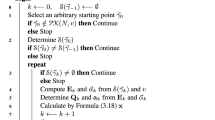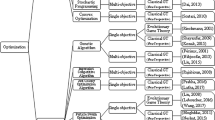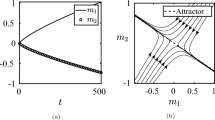Abstract
In coalition formation games self-organized coalitions are created as a result of the strategic interactions of independent agents. In this paper we assume that for each couple of agents (i, j), weight \(w_{i,j}=w_{j,i}\) reflects how much agents i and j benefit from belonging to the same coalition. We consider the (symmetric) modified fractional hedonic game, that is a coalition formation game in which agents’ utilities are such that the total benefit of agent i belonging to a coalition (given by the sum of \(w_{i,j}\) over all other agents j belonging to the same coalition) is averaged over all the other members of that coalition, i.e., excluding herself. Modified fractional hedonic games constitute a class of succinctly representable hedonic games. We are interested in the scenario in which agents, individually or jointly, choose to form a new coalition or to join an existing one, until a stable outcome is reached. To this aim, we consider common stability notions leading to strong Nash stable outcomes, Nash stable outcomes or core stable outcomes: we study their existence, complexity and performance, both in the case of general weights and in the case of 0–1 weights. In particular, we completely characterize the existence of the considered stable outcomes and show many tight or asymptotically tight results on the performance of these natural stable outcomes for modified fractional hedonic games, also highlighting the differences with respect to the model of fractional hedonic games, in which the total benefit of an agent in a coalition is averaged over all members of that coalition, i.e., including herself.












Similar content being viewed by others
References
Aziz, H., Brandl, F., Brandt, F., Harrenstein, P., Olsen, M., & Peters, D. (2019). Fractional hedonic games. ACM Transactions on Economics and Computation (to appear)
Aziz, H., Brandt, F., & Harrenstein, P. (2014). Fractional hedonic games. In Proceedings of the 13th international conference on autonomous agents and multiagent systems (AAMAS) (pp. 5–12).
Aziz, H., Brandt, F., & Seedig, H. G. (2013). Computing desirable partitions in additively separable hedonic games. Artificial Intelligence, 195, 316–334.
Aziz, H., Gaspers, S., Gudmundsson, J., Mestre, J., & Täubig, H. (2015). Welfare maximization in fractional hedonic games. In Proceedings of the 24th international joint conference on artificial intelligence (IJCAI) (pp. 25–31).
Aziz, H., & Keijzer, B.d. (2011). Complexity of coalition structure generation. In Proceedings of the 10th international conference on autonomous agents and multiagent systems (AAMAS) (pp. 191–198).
Aziz, H., & Savani, R. (2016). Hedonic games. In F. Brandt, V. Conitzer, U. Endriss, J. Lang, & A. D. Procaccia (Eds.), Handbook of computational social choice (chap. 15, pp. 356–376). Cambridge: Cambridge University Press
Bachrach, Y., Kohli, P., Kolmogorov, V., & Zadimoghaddam, M. (2013). Optimal coalition structure generation in cooperative graph games. In Proceedings of the 27th AAAI conference on artificial intelligence (AAAI) (pp. 81–87).
Bachrach, Y., Meir, R., Jung, K., & Kohli, P. (2010). Coalitional structure generation in skill games. In Proceedings of the 24th AAAI conference on artificial intelligence (AAAI) (pp. 703–708).
Ballester, C. (2004). Np-completeness in hedonic games. Games and Economic Behavior, 49(1), 1–30.
Balliu, A., Flammini, M., Melideo, G., & Olivetti, D. (2017). Nash stability in social distance games. In Proceedings of the 31st AAAI conference on artificial intelligence (AAAI) (pp. 342–348).
Balliu, A., Flammini, M., & Olivetti, D. (2017). On Pareto optimality in social distance games. In Proceedings of the 31st AAAI conference on artificial intelligence (AAAI) (pp. 349–355).
Banerjee, S., Konishi, H., & Sönmez, T. (2001). Core in a simple coalition formation game. Social Choice and Welfare, 18, 135–153.
Bansal, N., Blum, A., & Chawla, S. (2004). Correlation clustering. Machine Learning, 56(1–3), 89–113.
Bilò, V., Fanelli, A., Flammini, M., Monaco, G., & Moscardelli, L. (2014). Nash stability in fractional hedonic games. In Proceedings of the 10th international conference on web and internet economics (WINE) (pp. 486–491).
Bilò, V., Fanelli, A., Flammini, M., Monaco, G., & Moscardelli, L. (2015). On the price of stability of fractional hedonic games. In Proceedings of the 14th international conference on autonomous agents and multiagent systems, (AAMAS) (pp. 1239–1247).
Bilò, V., Fanelli, A., Flammini, M., Monaco, G., & Moscardelli, L. (2018). Nash stable outcomes in fractional hedonic games: Existence, efficiency and computation. Journal of Artificial Intelligence Research, 62, 315–371.
Bilò, V., Fanelli, A., Flammini, M., Monaco, G., & Moscardelli, L. (2019). Optimality and Nash stability in additively separable generalized group activity selection problems. In Proceedings of the 28th international joint conference on artificial intelligence (IJCAI) (pp. 102–108).
Bogomolnaia, A., & Jackson, M. O. (2002). The stability of hedonic coalition structures. Games and Economic Behavior, 38, 201–230.
Brandl, F., Brandt, F., & Strobel, M. (2015). Fractional hedonic games: Individual and group stability. In Proceedings of the 14th international conference on autonomous agents and multiagent systems, (AAMAS) (pp. 1219–1227).
Carosi, R., Monaco, G., & Moscardelli, L. (2019). Local core stability in simple symmetric fractional hedonic games. In Proceedings of the 18th international conference on autonomous agents and multiagent systems (AAMAS) (pp. 574–582).
Charikar, M., Guruswami, V., & Wirth, A. (2005). Clustering with qualitative information. Journal of Computer and System Sciences, 71(3), 360–383.
Demaine, E. D., Emanuel, D., Fiat, A., & Immorlica, N. (2006). Correlation clustering in general weighted graphs. Theoretical Computer Science, 361(2–3), 172–187.
Deng, X., & Papadimitriou, C. H. (1994). On the complexity of cooperative solution concepts. Mathematics of Operations Research, 19(2), 257–266.
Dréze, J. H., & Greenberg, J. (1980). Hedonic coalitions: Optimality and stability. Econometrica, 48, 987–1003.
Elkind, E., Fanelli, A., & Flammini, M. (2016). Price of Pareto optimality in hedonic games. In Proceedings of the 30th AAAI conference on artificial intelligence (AAAI) (pp. 475–481).
Feldman, M., Lewin-Eytan, L., & Naor, J. S. (2015). Hedonic clustering games. ACM Transactions on Parallel Computing, 2(1), 4:1–4:48.
Flammini, M., Monaco, G., Moscardelli, L., Shalom, M., & Zaks, S. (2018). Online coalition structure generation in graph games. In Proceedings of the 17th international conference on autonomous agents and multiagent systems (AAMAS) (pp. 1353–1361).
Flammini, M., Monaco, G., & Zhang, Q. (2017). Strategyproof mechanisms for additively separable hedonic games and fractional hedonic games. In Proceedings of the 15th workshop on approximation and online algorithms (WAOA) (pp. 301–316).
Harks, T., Hoefer, M., Klimm, M., & Skopalik, A. (2013). Computing pure nash and strong equilibria in bottleneck congestion games. Mathematical Programming, 141(1–2), 193–215.
Hell, P., & Kirkpatrick, D. G. (1984). Packings by cliques and by finite families of graphs. Discrete mathematics, 49(1), 45–59.
Kaklamanis, C., Kanellopoulos, P., & Papaioannou, K. (2016). The price of stability of simple symmetric fractional hedonic games. In Proceedings of the 9th international symposium on algorithmic game theory (SAGT) (pp. 220–232).
Monaco, G., Moscardelli, L., & Velaj, Y. (2018). Hedonic games with social context. In Proceedings of the 19th Italian conference on theoretical computer science (ICTCS) (pp. 24–35).
Monaco, G., Moscardelli, L., & Velaj, Y. (2018). Stable outcomes in modified fractional hedonic games. In Proceedings of the 17th international conference on autonomous agents and multiagent systems (AAMAS) (pp. 937–945).
Monaco, G., Moscardelli, L., & Velaj, Y. (2019). On the performance of stable outcomes in modified fractional hedonic games with egalitarian social welfare. In Proceedings of the 18th international conference on autonomous agents and multiagent systems (AAMAS) (pp. 873–881).
Ohta, N., Conitzer, V., Ichimura, R., Sakurai, Y., Iwasaki, A., & Yokoo, M. (2009). Coalition structure generation utilizing compact characteristic function representations. In Proceedings of the 15th international conference on principles and practice of constraint programming (CP) (pp. 623–638).
Olsen, M. (2009). Nash stability in additively separable hedonic games and community structures. Theory of Computing Systems, 45(4), 917–925.
Olsen, M. (2012). On defining and computing communities. In Proceedings of the conferences in research and practice in information technology (pp. 97–102).
Peters, D. (2016). Graphical hedonic games of bounded treewidth. In Proceedings of the 30th AAAI conference on artificial intelligence (AAAI) (pp. 586–593).
Peters, D., & Elkind, E. (2015). Simple causes of complexity in hedonic games. In Proceedings of the 24th international joint conference on artificial intelligence (IJCAI) (pp. 617–623).
Rahwan, T., & Jennings, N. R. (2008). An improved dynamic programming algorithm for coalition structure generation. In Proceedings of the 7th international joint conference on autonomous agents and multiagent systems (AAMAS) (pp. 1417–1420).
Rahwan, T., Michalak, T. P., Wooldridge, M., & Jennings, N. (2012). Anytime coalition structure generation in multi-agent systems with positive or negative externalities. Artificial Intelligence, 186, 95–122.
Rahwan, T., Michalak, T. P., Wooldridge, M., & Jennings, N. (2015). Coalition structure generation: A survey. Artificial Intelligence, 229, 139–174.
Rahwan, T., Ramchurn, S. D., Jennings, N. R., & Giovannucci, A. (2009). An anytime algorithm for optimal coalition structure generation. Journal of Artificial Intelligence Research, 34, 521–567.
Rosenthal, R. W. (1973). A class of games possessing pure-strategy nash equilibria. International Journal of Game Theory, 2, 65–67.
Sandholm, T., Larson, K., Andersson, M., Shehory, O., & Tohmé, F. (1999). Coalition structure generation with worst case guarantees. Artificial Intelligence, 111(1–2), 209–238.
Shehory, O., & Kraus, S. (1998). Methods for task allocation via agent coalition formation. Artificial Intelligence, 101(1–2), 165–200.
Sung, S. C., & Dimitrov, D. (2010). Computational complexity in additive hedonic games. European Journal of Operational Research, 203(3), 635–639.
Ueda, S., Iwasaki, A., Yokoo, M., Silaghi, M., Hirayama, K., & Matsui, T. (2010). Coalition structure generation based on distributed constraint optimization. In Proceedings of the 24th conference on artificial intelligence (AAAI) (pp. 197–203).
Voice, T., Polukarov, M., & Jennings, N. R. (2012). Coalition structure generation over graphs. Journal of Artificial Intelligence Research, 45, 165–196.
Wright, M., & Vorobeychik, Y. (2015). Mechanism design for team formation. In Proceedings of the 29th conference on artificial intelligence (AAAI) (pp. 1050–1056).
Author information
Authors and Affiliations
Corresponding author
Additional information
Publisher's Note
Springer Nature remains neutral with regard to jurisdictional claims in published maps and institutional affiliations.
The paper is an extension of our AAMAS paper [33].
Rights and permissions
About this article
Cite this article
Monaco, G., Moscardelli, L. & Velaj, Y. Stable outcomes in modified fractional hedonic games. Auton Agent Multi-Agent Syst 34, 4 (2020). https://doi.org/10.1007/s10458-019-09431-z
Published:
DOI: https://doi.org/10.1007/s10458-019-09431-z




